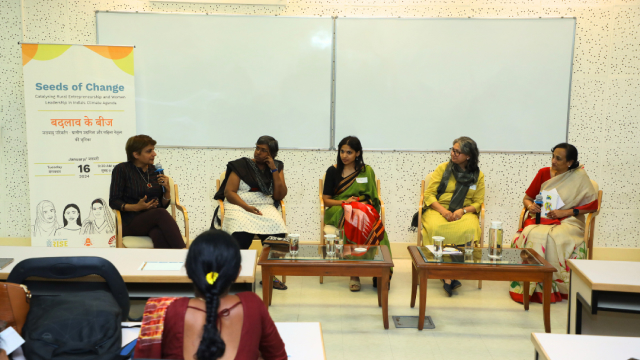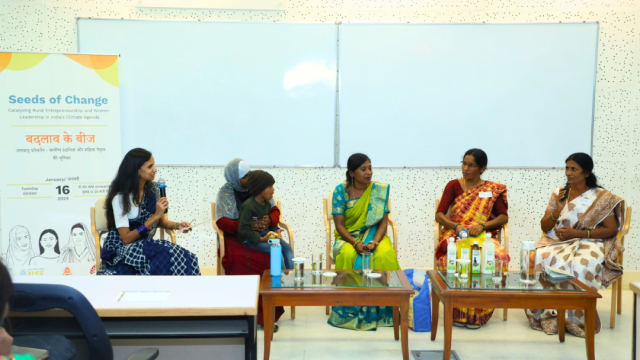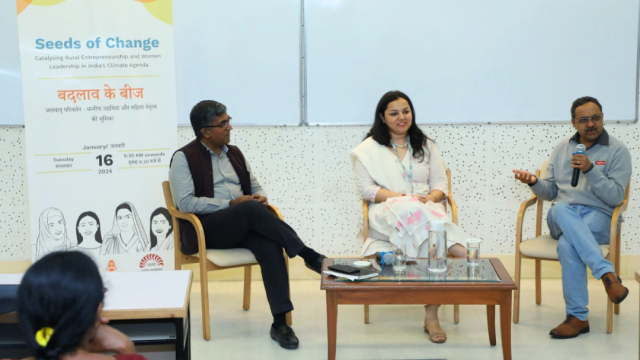Jan 2024
Seeds of Change: Catalyzing Rural Entrepreneurship and Women's Leadership in India's Climate Agenda
Climate change in India has significantly affected the lives of women, further exacerbating existing challenges like food security and poverty. To tackle these issues, there's a need to focus on sustainable livelihoods and empower women to adapt to changing conditions. Collaboration across various sectors, involving governments, organisations, philanthropy, and practitioners, is essential to pool resources and knowledge for addressing the intersection of gender equality, climate action, and resilient livelihoods. Civil Society Organizations (CSOs) play a crucial role in this collective effort.
ClimateRISE Alliance teamed up with Buzz Women and the Indian Institute of Management Bangalore (IIM Bangalore) to organise a gathering titled "Seeds of Change: Catalyzing Rural Entrepreneurship and Women's Leadership in India's Climate Agenda" on January 16, 2024. The convening brought together diverse individuals and organisations to discuss the intersection of women's livelihoods, entrepreneurship, food security, and climate action in India. It showcased successful models and programs by leading CSOs, highlighting the pivotal role women play in building community resilience. The event also featured inspiring stories of 'eco-preneurs' from rural Karnataka and concluded by identifying opportunities to secure finance for sustainable livelihoods for women through three-panel discussions.
Reflections on Strategies from CSOs working on Women and Climate Action
The first session featured discussions by leading CSOs on the intersection of climate action and women's livelihoods. Topics ranged from empowering women in rural Maharashtra through income-generating activities to providing financial education and eco-friendly skills in Gujarat and Karnataka. The panel emphasised the importance of inclusion, capacity building, and market access for women, showcasing a holistic approach to climate-friendly practices. Anagha Kamath from Mann Deshi Foundation highlighted how “Women are hesitant because of the resistance they face from their homes. But once they step out and start earning enough to sustain the family and themselves, the narrative completely changes. And that's where we win.” Overall, the session highlighted the vital role CSOs play in addressing challenges at the nexus of women's livelihoods and climate action.
Spotlighting Stories of Climate Champions
The second session showcased five inspiring women entrepreneurs from rural Karnataka leading green businesses prioritising sustainability. They shared their journeys, highlighting challenges overcome and innovative solutions implemented, ranging from eco-friendly tooth powder, organic cold pressed oils to other sustainable products. The session underscored the untapped potential of rural women as climate champions, fostering empowerment and a collective commitment to building a sustainable future.
Financing Opportunities for Women-led Initiatives
The last session emphasised the critical need to channelise long-term financial resources to strengthen sustainable livelihoods for rural women, promoting economic empowerment and climate resilience. Financial institutions were highlighted as key players in fostering financial inclusion through tailored services for women entrepreneurs, while philanthropy was seen as a catalyst for supporting new women-led enterprises with agile risk capital. One of the keynote speakers, Rajiv Prakash from Rainmatter Foundation highlighted the importance of investing in capacity building, collaborating with CSOs for training, and adopting a trust-based funding approach for grassroots organisations.
Moving forward, it is crucial to translate the momentum into sustained, collaborative action. Beyond these discussions, we must strengthen partnerships, fostering continuous dialogue, knowledge exchange, and financial support for our women eco-preneurs. One of the panellists, Ashwini Kulkarni from Pragati Abhiyan, reflected on how women need to be added to policy making circles “Women need to be in the planning spaces to get involved in planning processes, maybe at Gram Panchayat levels. This would mark an important shift.”
These narratives should inspire ongoing interventions and policy advocacy, promoting gender equality, environmental sustainability, and inclusive economic practices. By uniting in collective efforts and a shared commitment, we can cultivate a resilient ecosystem where women thrive at the crossroads of livelihoods and climate action.




